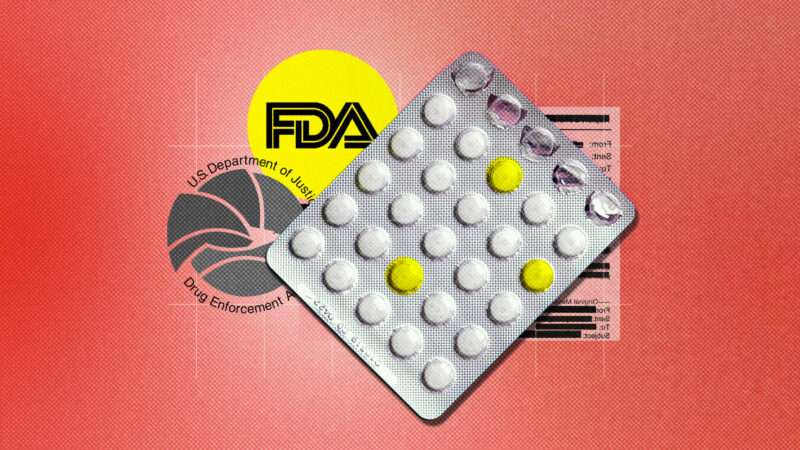ออฟไลน์ด้วยแอป Player FM !
Why We Can't Have Nice Things: The War on Drugs
Manage episode 444513590 series 3498470

In many cases, the government's attempts at regulating health care markets are complex, convoluted operations—and seeing the consequences of those policies can be tricky.
Other times, however, it is very straightforward: the government just says "no."
When that happens, it doesn't matter what patients need or what doctors want. In its rush to prevent some people from recreationally using certain drugs or accessing certain treatments, the federal government creates huge roadblocks for patients with legitimate needs and doctors who are only trying to help.
That's what happened earlier this year when the Food and Drug Administration (FDA) decided not to approve MDMA-assisted psychotherapy as a treatment for post-traumatic stress disorder (PTSD).
"Who is harmed, primarily, are all the people with post-traumatic stress disorder who are hoping to have access to this treatment," says Julie Holland, a New York-based psychiatrist and author. "And I would argue honestly that psychiatrists and therapists are also harmed because we are having more and more people who are traumatized, and our treatment options have not changed in a very long time."
Less directly, that's also what has caused a serious shortage of Adderall and other drugs used to treat Attention Deficit Hyperactivity Disorder (ADHD). Because the Drug Enforcement Administration (DEA) strictly limits the availability of substances like amphetamine or dextroamphetamine in an attempt to reduce their recreational uses, patients with legitimate prescriptions can end up having a hard time filling their prescriptions.
"It took me weeks to get a prescription for something that really negatively affects my life," says C.J. Ciaramella, a reporter at Reason who has written about his personal struggles with ADHD. "It kept me suffering and anxious."
Further reading for this week's episode:
"It Took Me Months To Get the ADHD Meds the DEA Says Are Overprescribed," by C.J. Ciaramella, Reason
"Dickens, Diabetes, and Positive-Sum Games," by Anne Bradley
Good Chemistry: The Science of Connection, from Soul to Psychedelics, by Julie Holland
"Adderall Shortage Led to 10 Percent Fewer Prescriptions Being Filled," by Joe Lancaster, Reason
"Founder of Adderall 'Pill Mill' Sent Back to Jail," by Rolfe Winkler, The Wall Street Journal
"FDA Declines To Approve MDMA-Assisted Psychotherapy as a PTSD Treatment," by Jacob Sullum, Reason
- Producer: Hunt Beaty
The post Why We Can't Have Nice Things: The War on Drugs appeared first on Reason.com.
14 ตอน
Manage episode 444513590 series 3498470

In many cases, the government's attempts at regulating health care markets are complex, convoluted operations—and seeing the consequences of those policies can be tricky.
Other times, however, it is very straightforward: the government just says "no."
When that happens, it doesn't matter what patients need or what doctors want. In its rush to prevent some people from recreationally using certain drugs or accessing certain treatments, the federal government creates huge roadblocks for patients with legitimate needs and doctors who are only trying to help.
That's what happened earlier this year when the Food and Drug Administration (FDA) decided not to approve MDMA-assisted psychotherapy as a treatment for post-traumatic stress disorder (PTSD).
"Who is harmed, primarily, are all the people with post-traumatic stress disorder who are hoping to have access to this treatment," says Julie Holland, a New York-based psychiatrist and author. "And I would argue honestly that psychiatrists and therapists are also harmed because we are having more and more people who are traumatized, and our treatment options have not changed in a very long time."
Less directly, that's also what has caused a serious shortage of Adderall and other drugs used to treat Attention Deficit Hyperactivity Disorder (ADHD). Because the Drug Enforcement Administration (DEA) strictly limits the availability of substances like amphetamine or dextroamphetamine in an attempt to reduce their recreational uses, patients with legitimate prescriptions can end up having a hard time filling their prescriptions.
"It took me weeks to get a prescription for something that really negatively affects my life," says C.J. Ciaramella, a reporter at Reason who has written about his personal struggles with ADHD. "It kept me suffering and anxious."
Further reading for this week's episode:
"It Took Me Months To Get the ADHD Meds the DEA Says Are Overprescribed," by C.J. Ciaramella, Reason
"Dickens, Diabetes, and Positive-Sum Games," by Anne Bradley
Good Chemistry: The Science of Connection, from Soul to Psychedelics, by Julie Holland
"Adderall Shortage Led to 10 Percent Fewer Prescriptions Being Filled," by Joe Lancaster, Reason
"Founder of Adderall 'Pill Mill' Sent Back to Jail," by Rolfe Winkler, The Wall Street Journal
"FDA Declines To Approve MDMA-Assisted Psychotherapy as a PTSD Treatment," by Jacob Sullum, Reason
- Producer: Hunt Beaty
The post Why We Can't Have Nice Things: The War on Drugs appeared first on Reason.com.
14 ตอน
ทุกตอน
×ขอต้อนรับสู่ Player FM!
Player FM กำลังหาเว็บ




